The Pardada Pardadi Education Society (estb. 2000) has transformed socially backward Anupshahr in the badlands of Uttar Pradesh into a model village, offering a blueprint for the upliftment of women and empowerment of girl children summiya yasmeen
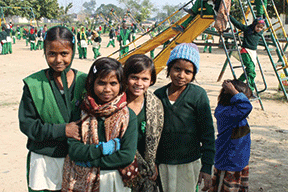
.gif) Four hours by road from Delhi, the village of Anupshahr in the badlands of Bulandshahr district of Uttar Pradesh (pop.200 million), is the epicentre of a remarkably successful experiment in girl child and woman empowerment. This educationally and socially backward hamlet (pop.23,000) has been transformed by the Pardada Pardadi Education Society (PPES, estb.2000) into a model village offering a blueprint for the upliftment of the status of women, and empowerment of girl children countrywide.
Four hours by road from Delhi, the village of Anupshahr in the badlands of Bulandshahr district of Uttar Pradesh (pop.200 million), is the epicentre of a remarkably successful experiment in girl child and woman empowerment. This educationally and socially backward hamlet (pop.23,000) has been transformed by the Pardada Pardadi Education Society (PPES, estb.2000) into a model village offering a blueprint for the upliftment of the status of women, and empowerment of girl children countrywide.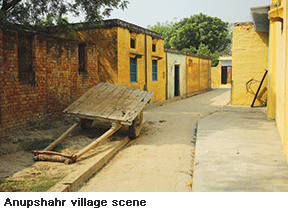
Founded by former South Asia head of DuPont, Virendra (‘Sam’) Singh, to “empower girl children in rural India through education”, PPES runs a free-of-charge K-12 Pardada Pardadi Girls Vocational School (PPGVS) with an aggregate enrolment of 1,255 students mentored by 59 teachers; a health centre for village inhabitants; community development programmes for over 2,000 women of 48 surrounding hamlets; a call centre training academy; a sanitary napkins production unit; and a textiles unit which manufactures home furnishing and corporate gifting products.
Sam Singh
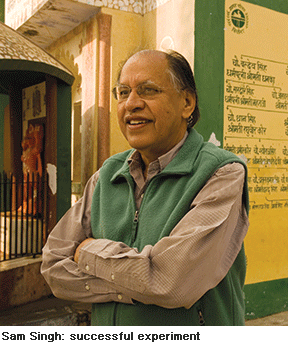 An engineering graduate of Panjab University with a Masters in textiles engineering awarded by the University of Massachusetts, Lowell, Sam Singh began his professional career with the Delhi-based DCM Group in 1961. Four years later, he was recruited by the US-based chemicals behemoth DuPont Inc (annual revenue: $35.7 billion or Rs.214,200 crore), whom he served until retirement in 2000. “During my three decades plus in the US, I was repeatedly reminded that India was steeped in poverty, ignorance and gender discrimination. During one of my visits back home, it occurred to me that the golden key to liberating the country from ignorance and poverty was education and empowerment of girl children. But I had to wait for my retirement in 2000 until I had enough savings to start a girls school,” says Sam, who donated 60 acres of land in Anupshahr to PPES.
An engineering graduate of Panjab University with a Masters in textiles engineering awarded by the University of Massachusetts, Lowell, Sam Singh began his professional career with the Delhi-based DCM Group in 1961. Four years later, he was recruited by the US-based chemicals behemoth DuPont Inc (annual revenue: $35.7 billion or Rs.214,200 crore), whom he served until retirement in 2000. “During my three decades plus in the US, I was repeatedly reminded that India was steeped in poverty, ignorance and gender discrimination. During one of my visits back home, it occurred to me that the golden key to liberating the country from ignorance and poverty was education and empowerment of girl children. But I had to wait for my retirement in 2000 until I had enough savings to start a girls school,” says Sam, who donated 60 acres of land in Anupshahr to PPES.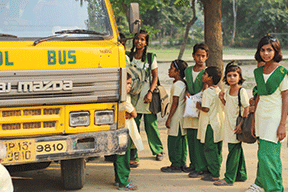
A typically American-style hard-driving CEO, during the past 15 years Sam Singh has transformed PPES (annual budget Rs.3 crore) into a premier rural development organisation with a strong focus on education and health.
Pardada Pardadi Girls Vocational School
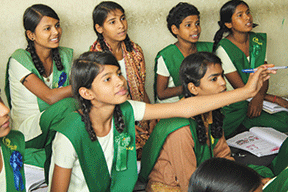 The first initiative of PPES, the Pardada Pardadi Girls Vocational School was started in 2000 with 45 girl children and two teachers in a makeshift classroom. Confronted with the untenable situation of 31 children dropping out because of parental discouragement, Singh devised an innovative scheme of crediting Rs.10 per day into newly opened bank accounts of girl students attending class, with the proviso of no withdrawals until completion of the class X school-leaving exam.
The first initiative of PPES, the Pardada Pardadi Girls Vocational School was started in 2000 with 45 girl children and two teachers in a makeshift classroom. Confronted with the untenable situation of 31 children dropping out because of parental discouragement, Singh devised an innovative scheme of crediting Rs.10 per day into newly opened bank accounts of girl students attending class, with the proviso of no withdrawals until completion of the class X school-leaving exam.
Unsurprisingly, the current enrolment of PPGVS, which supplements its academic curriculum with VET (vocational education training), has risen to 1,255 girl students with five applications for every available seat.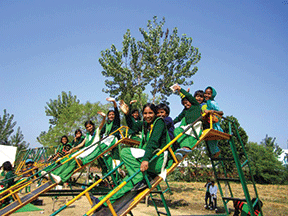
.gif) Unsurprisingly again, PPGVS has been consistently outperforming all government schools in Bulandshahr district (pop. 3.5 million). In 2014, the entire batch of 34 students who wrote the class X state board exam passed in the first division. Since 2006, 300 girls have graduated from PPGVS, with 243 successfully completing college education.
Unsurprisingly again, PPGVS has been consistently outperforming all government schools in Bulandshahr district (pop. 3.5 million). In 2014, the entire batch of 34 students who wrote the class X state board exam passed in the first division. Since 2006, 300 girls have graduated from PPGVS, with 243 successfully completing college education.
PPES health centre
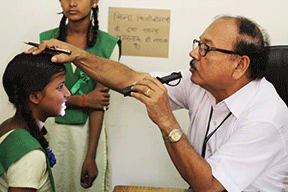 Inaugurated in 2012, PPES’ health centre is the first established by an education institution in the district. Regular health and hygiene workshops are conducted for students and parents. Moreover, the society has built two community toilet complexes which serve 135 families, and several individual toilets in the homes of PPES girls.
Inaugurated in 2012, PPES’ health centre is the first established by an education institution in the district. Regular health and hygiene workshops are conducted for students and parents. Moreover, the society has built two community toilet complexes which serve 135 families, and several individual toilets in the homes of PPES girls.
Economic empowerment
PPES also runs a separate vocational school where girl students receive training in embroidery, appliqué work and block printing. After completion of their study programmes, students have the option to work with the Pardada Pardadi Production Centre, which produces home furnishings and gift items.
A call centre training unit has been established in association with Kingdom of Dreams (KoD), Gurgaon, and PPES’ Blackberry unit employs more than 50 girls and women who roll out 16,000 Blackberry mobile phone covers per month.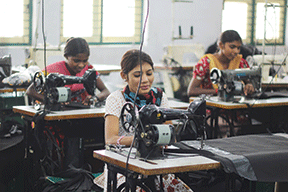
Community development
.gif) PPES’ community development division has mobilised and collectivised over 2,000 women into 186 self-help groups which provide short-term business development loans to members. Moreover, it has launched a Dairy Best Practices programme in 30 villages to increase women’s incomes from traditional milk-based businesses and promoted two cattle artificial insemination centres.
PPES’ community development division has mobilised and collectivised over 2,000 women into 186 self-help groups which provide short-term business development loans to members. Moreover, it has launched a Dairy Best Practices programme in 30 villages to increase women’s incomes from traditional milk-based businesses and promoted two cattle artificial insemination centres.
The impact of Sam Singh’s pioneering rural development effort is pervasive in Anupshahr. The village roads are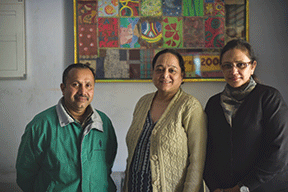 well-maintained, devoid of litter and open garbage dumps with paths leading to the school illuminated by solar-powered lanterns. “There’s visibly greater gender egalitarianism in Anupshahr, and the average marriage age of village girls has increased to 20.3 years. PPES’ welfare programmes have directly impacted more than 17,500 women and many more indirectly.
well-maintained, devoid of litter and open garbage dumps with paths leading to the school illuminated by solar-powered lanterns. “There’s visibly greater gender egalitarianism in Anupshahr, and the average marriage age of village girls has increased to 20.3 years. PPES’ welfare programmes have directly impacted more than 17,500 women and many more indirectly.
Our 15-year journey proves that a holistic education model focusing on girls is the key to development of society,” says Renuka Gupta, an alumna of Delhi and Jamia Milia Islamia universities and chief executive of PPES.